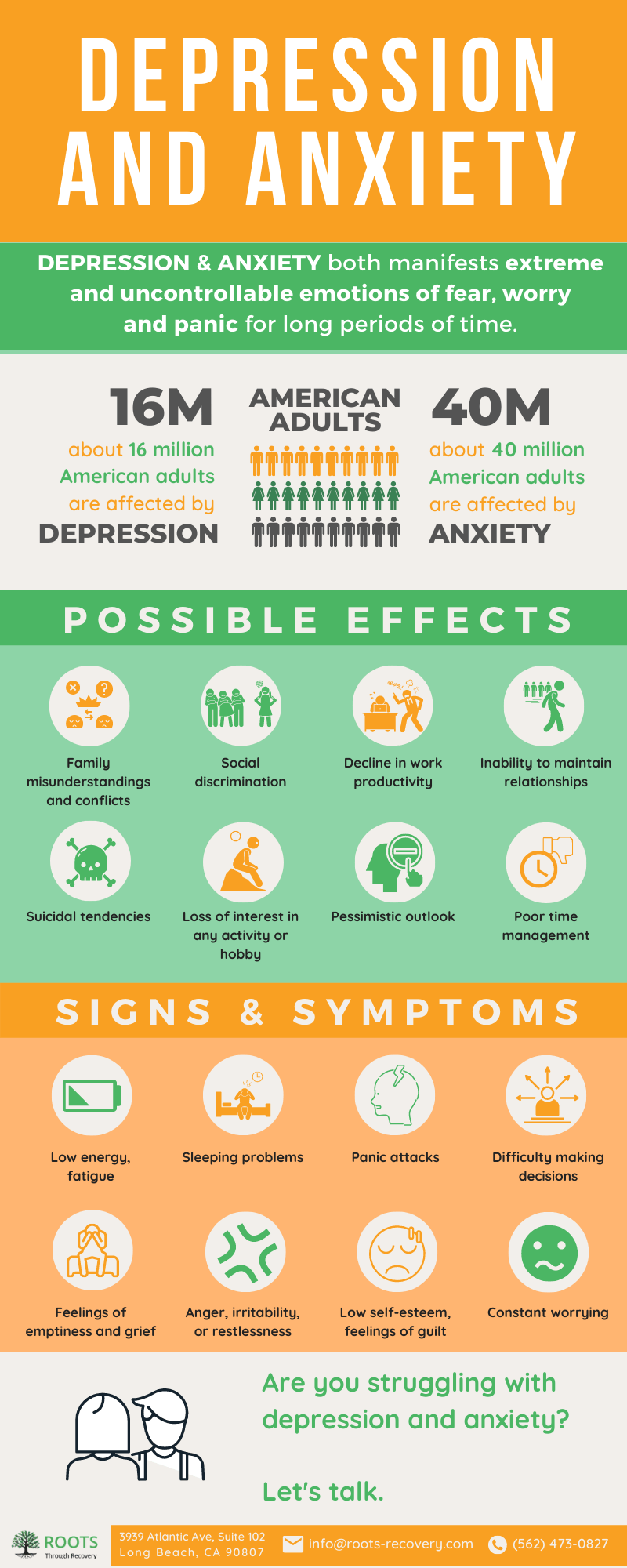
Depression and Anxiety
Depression and Anxiety are among the most common issues faced by adults in the United States, and can be very overwhelming to deal with. Feelings of irritability, anger, sadness, worthlessness may be normal reactions to life’s stressors. But depression and anxiety are much more severe and tend to persist for a long time. People manifest depression or anxiety differently. For some, it’s worrying about little things they need to do but having zero motivation to do any of it. Others are ashamed to admit to their depression and anxiety which could have serious repercussions if left untreated.
However you’re experiencing depression or anxiety, it’s not meant for you to deal with them on your own. Seeking help will provide a healthier outlet for you to express your emotions. There are ways to guide your habits and lifestyle so you can deal with your emotions better. Additionally, we offer a free assessment test that one can take.
What is it?
Every year, about 16 million American adults are affected by depression. Genetic, biological, environmental, and psychological factors seem to cause one’s depression. It often goes hand in hand with anxiety. Both depression and anxiety manifests extreme and uncontrollable emotions of fear, worry and panic for longer periods of time. Some of its possible effects on the individual are the following:
- Family misunderstandings and conflicts
- Social discrimination
- Decline in work productivity
- Inability to maintain relationships
- Suicidal tendencies
- Loss of interest in any activity or hobby
- Withdrawal from peers
- Poor time management
- Reckless behavior around social situations
- School refusal
What are the signs and symptoms?
Low energy, fatigue
Changes in appetite
Sleeping problems: oversleeping, insomnia, restless, unsatisfying sleep
Muscle tension
Racing heart
Grinding teeth
Cramps, or gastrointestinal problems
Panic attacks
Pessimistic outlook
Difficulty making decisions
Feelings of emptiness and grief
Anger, irritability, or restlessness
Low self-esteem, feelings of worthlessness and guilt
Constant worrying
Suicide attempts
FAQs
Q: Is depression hereditary?
A: There’s a notion that depression can be inherited as brought about by genetic factors that contribute to the condition. But there has been no conclusive evidence to reinforce this notion as the research into this topic is still in its early stages.
Q: How do I know when my anxiety or sadness is already a psychiatric disorder?
A: It’s normal to feel anxious when faced with a confusing situation or to feel sad in the face of unfavorable circumstances. But to have a psychiatric disorder is different in the sense that it is uncontrollable, extreme, and prevails regardless of the present situation. If you feel overwhelmingly anxious and sad everyday, there’s a possibility that it’s already a disorder.
Q: Are the signs of depression and anxiety different among men and women?
A: Both men and women experience depression and anxiety but may usually have different manifestations. Men show signs of this condition through irritability, anger, recklessness, and substance abuse among others. Women on the other hand often feel deep grief, guilt, and worthlessness.
Q: Why is it important that I get help?
A: It’s important to get help because depression and anxiety can be a very frustrating and overwhelming pit to be in. Getting help will allow your hearts to gradually heal as you slowly open yourselves up to others. There’s so much more in store for you when you live a life free from any psychiatric disorder.
Take the First Step Now
If you need to find a place that feels comfortable and supportive, let Roots Through Recovery’s experienced clinicians and case management team work with you to help determine your next steps. We want you to have choices that will give you and your loved ones the best outcomes.
